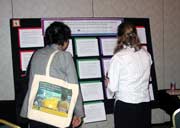
Annual Research Conference
17th Annual Research Conference Highlights
February 28 - March 3, 2004
The 2004 conference was held at a time of special opportunity - as recent recommendations from the President's New Freedom Commission on Mental Health suggested a renewed national emphasis on children's mental health policy.
For the past 17 years, a national network of researchers, evaluators, administrators, policy makers, practitioners, advocates and family members have come to Tampa to discuss research findings, work in progress, and new strategies for applied systems of care research. Information from community, state and national-level investigations highlights what it takes to translate the science of systems of care into improved service provision for all children with serious emotional or behavioral problems and their families.
On Sunday evening,  February 29, the 17th annual research conference began
with a poster presentation session and reception. Poster
presentation sessions, on both Sunday and Tuesday evenings,
offered opportunities for in-depth discussion of featured
projects, as well as the ideal forum to connect with
colleagues.
February 29, the 17th annual research conference began
with a poster presentation session and reception. Poster
presentation sessions, on both Sunday and Tuesday evenings,
offered opportunities for in-depth discussion of featured
projects, as well as the ideal forum to connect with
colleagues.
On
Monday morning
the Gwen
Iding Brogden Distinguished Lecture Series featured Michael
Hogan, Chair of the New Freedom Commission on Mental
Health. Dr. Hogan provided an overview of the Commission's
work during the past year, with a special focus on the
soon-to-be released Children and Families Subcommittee
report that will recommend the need for a major transformation.
"Changes at every level," said Hogan, "change
that is deep and largely based on small steps."
The Commission described transformation
as a vision, a process, and an outcome.
New Freedom Commission
participants Jane Adams, Larke Nahme Huang,
and Roy Wilson
also shared their perspectives. Huang introduced the
New Freedom Commission promise for children, which states
that "our communities, states, and nation provide
access to comprehensive,
home-and
community-based family-centered services and supports
for children with mental health disorders and
their families, and create conditions that promote
positive
mental health for all children."
“We need to have what you know,” was the message to researchers from Jane Adams, Executive Director of Keys for Networking, Inc., the Kansas state organization of the Federation of Families for Children's Mental Health. Adams expressed her concern for the amount of time it takes to turn research findings into practice, which is about 15 years. Roy Wilson discussed the need for family driven commitment to take place.
A symposia by Latin American researchers was offered Monday evening, as well as a special reception in their honor. Representing countries of Peru, Colombia, Chile and Brazil, honorees included Dr. Irene Rizzini, President of Childwatch International, Dr. Carmen Lopez, who helped implement the national School Mental Health Program in Chile, and Dr. Victoria Lidchi, coordinator of the International Society for the Prevention of Child Abuse and Neglect. Special Guest Speaker for the evening was Frank Sanchez, former Tampa mayoral candidate, who worked for former Gov. Bob Graham and in the Clinton administration. His accomplishments include developing a program to train teachers and community leaders in conflict resolution in Colombia.
Tuesday morning's plenary session featured A Kathryn Power, Director of the Center for Mental Health Services, who discussed the CMHS plans in facilitating the transformation change called for in the President's New Freedom Commission on Mental Health Report, Achieving the Promise: Transforming Mental Health Care in America. "CMHS could not have done its important work without the work of the Reserach & Training Center," said Power, as she thanked the Center for twenty years of service aimed at improving the lives of children at risk and their families. Also speaking at Tuesday's plenary was the Center's Director, Robert Friedman, who identified current trends in implementing systems of care, and offered new concepts to be added to the framework.
A special high light
at this year's conference was the conversation hour each
morning after the plenary sessions. An informal opportunity
was provided for keynote speakers to meet and answer
questions from attendees. The photo to the left shows
Larke Nahme Huang during Monday morning's conversation
hour.
light
at this year's conference was the conversation hour each
morning after the plenary sessions. An informal opportunity
was provided for keynote speakers to meet and answer
questions from attendees. The photo to the left shows
Larke Nahme Huang during Monday morning's conversation
hour.
Concurrent sessions ran Monday morning through Tuesday evening, offering a variety of paper presentations and symposia, typically arranged by topic. This year's highlights included a presentation of new information on empirical support for wraparound, sessions addressing service issues for youth transitioning to adulthood, and an overview of implementation of Multisystemic Therapy (MST) in the child welfare system. Participants also joined topical discussion sessions that offered an interactive dialogue on a variety of current issues in child mental health service delivery.
Thematic tracks for this year included strategies for implementing and evaluating evidence-based practice in real world settings, funding strategies for systems of care, outcomes from several aspects of implementation of the Comprehensive Community Mental Health Services for Children and Their Families Program, and lessons learned from school-based service provision. There were sessions on measurement and methodology, and research specific to early childhood, child welfare, family collaboration in the development of services and evaluation, and issues of access to effective treatment for children and youth with a range of specific emotional/behavioral challenges, as well as diverse racial/ethnic backgrounds. A wide choice of Intensive Workshops were presented on Wednesday.
About the Center
Resources
- » Data Trends
- » School-Based Mental Health
- » Financing
- » Cultural Competence
- » Case Studies of System Implementation
- » Workforce Development & University-based Training
- » National Directory of Family-Run and Youth-Guided Organizations
- » Theory of Change Logic Models for SOC

